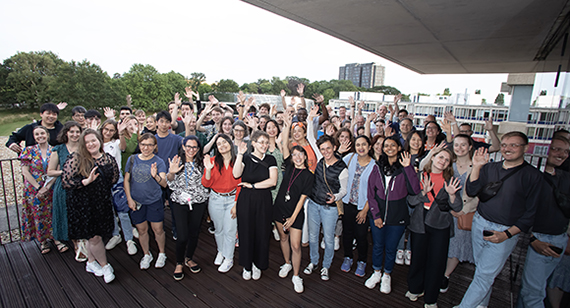Please note: This course will be taught online only.

Dr. Alexandra Hartman is an Associate Professor at the Department of Political Science, University College London. She has fieldwork experience in Cote d’Ivoire, Liberia, Myanmar and Jordan. She studies the social origins of violence and how individuals, communities and states construct order, using RCTs, survey experiments, micro-level data, and in-depth field research.

Dr. Florian G. Kern is a Senior Lecturer at the Department of Government, University of Essex. He has fieldwork experience in Kenya, Uganda, Tanzania and Native American reservations. He studies local governance, representation, and development, with a regional focus on Sub-Saharan Africa and indigenous North America. He is interested in issues of research transparency. He uses a variety of approaches, combining applied experimental and qualitative research, case studies, and fieldwork
Course Content
This course introduces participants to the various aspects of field research in the social sciences and prepares participants to subsequently conduct their own fieldwork. The course particularly focuses on the practical issues related to fieldwork using various methodologies. Issues tackled range from research ethics, organising interviews, focus groups, ethnographic work, household surveys, or field experiments, collaboration with local partners, research transparency and data sharing, acquiring research funding, the general logistics of preparing and conducting fieldwork in developing and conflict-affected countries or in more developed countries, etc.
Participants will learn step-by-step how to efficiently incorporate field research into their research agenda and how to navigate the myriad of related challenges when designing and administering their own fieldwork. While we particularly encourage participants to attend who already have concrete ideas of future field research (e.g. for their doctoral research), the course is also open to students and scholars who are interested in employing fieldwork more generally in the future.
Course objectives
Participants will be trained to design, prepare, and run their own field research using their increased awareness of the practical and logistical issues facing early career researchers in the field. Especially for doctoral students planning to incorporate fieldwork in their dissertation work this course will provide essential support. Generally, researchers aiming at employing field research for the first time will benefit from the course training by learning about challenges and opportunities related to field research in the social sciences. While the course content focuses heavily on examples from the instructors’ experience in developing countries, the materials will be applicable more generally to any type of fieldwork in various regions of the world.
Course prerequisites:
The course has no particular prerequisites
Required reading
Kern, F. G., & Vossiek, J. (2015). Get organised: the ‘Do’s’ preceding successful field research. European Political Science, 14, 137-148.
Elisabeth Wood. 2008. “Field Research.” In Carles Boix and Susan Stokes, eds., The Oxford Handbook of Comparative Politics. Oxford University Press.
Required text – this book will be provided by ESS:
Kapiszewski, D., MacLean, L. M., & Read, B. L. (2015). Field research in political science: practices and principles. Cambridge University Press.
Additional reading
Sriram, C. L., King, J. C., Mertus, J. A., Martin-Ortega, O., & Herman, J. (Eds.). (2009). Surviving field research: Working in violent and difficult situations. Routledge.
Lofland J., Snow, D., Anderson, L. and Lofland, L. (2006). Analyzing Social Settings: A Guide to Qualitative Observation and Analysis. Belmont, CA: Wadsworth
Please note: Recordings will only be available to online students for the length of the course’s duration for the purpose of catching up on missed content.
Timetable
|
Date
|
Topic
|
|
Day 1
|
Introduction to fieldwork
|
|
Day 2
|
Ethics before fieldwork
|
|
Day 3
|
Funding and budgets
|
|
Day 4
|
Site selection and community entry
|
|
Day 5
|
Ethics during fieldwork
|
|
Day 6
|
Observation in the field
|
|
Day 7
|
Interviews and focus groups in the field
|
|
Day 8
|
Experiments and surveys in the field
|
|
Day 9
|
Transparency and ethics after fieldwork
|
|
Day 10
|
Impact and giving back
|
Readings and applications
|
Day
|
Date
|
Topic/Readings
|
|
1
|
|
Introduction to fieldwork
|
|
Chapters 1-3. Kapiszewski, D., MacLean, L. M., & Read, B. L. (2015). Field research in political science: practices and principles. Cambridge University Press.
Elisabeth Wood. (2008). “Field Research.” In Carles Boix and Susan Stokes, eds., The Oxford Handbook of Comparative Politics. Oxford University Press.
Kern, F. G., & Vossiek, J. (2015). Get organised: the ‘Do’s’ preceding successful field research. European Political Science, 14, 137-148.
Application:
→ Student research project sketch. Please bring to class a one-page description of an ongoing or future research project. Please print out two hard copies for use during class.
|
|
2
|
|
Ethics before fieldwork
|
|
Chapter 4. Kapiszewski, D., MacLean, L. M., & Read, B. L. (2015). Field research in political science: practices and principles. Cambridge University Press.
Chapter 1 and Appendix. Goffman, A.(2014). On the Run: Fugative Life in an American City. Picador.
Singal, J. (2015). “The Internet Accused Alice Goffman of Faking Details in Her Study of a Black Neighborhood. I Went to Philadelphia to Check.” Available at: https://www.thecut.com/2015/06/ i-fact-checked-alice-goffman-with-her-subjects.html
Lubet, S. (2015). “Ethics on the Run”. The New Rambler Review, May 2015. Available at: http://newramblerreview.com/book-reviews/law/ ethics-on-the-run
Application:
→ Ethical Review Application, University of Essex
→ Research permit application, Uganda National Council on Science and Technology (UNCST)
→ Participant consent form and information form
→ Memorandum of understanding with collaboration partners
|
|
3
|
|
Funding and budgets
|
|
Agarwala, R. and Teitelbaum, E. (2010). “Trends in funding for dissertation field research: why do political science and sociology students win so few awards?”. PS: Political Science & Politics, 43(2), 283-293.
Application:
→ ESRC justification of resources
→ ESRC Grant Proposal Budget
→ Uganda Land Alliance intervention budget
→ Gantt chart
|
|
4
|
|
Site selection and community access
|
|
Seawright, J. and J. Gerring. 2008.“Case Selection Techniques in Case Study Research: A Menu of Qualitative and Quantitative Options.” Political Research Quarterly 61 (2): 294-308.
Chapters 1 -3. Lofland, J., Snow, D., Anderson, L. and Lofland, L. 2006. Analyzing Social Settings: A Guide to Qualitative Observation and Analysis. Belmont, CA: Wadsworth.
Saiyigh, R. “Resources, Researchers and Power: Recording ‘Real Life’ in Wadi Zeineh.” Middle East Report 173 (November-December 1991), pp. 23- 25.
Chapter 4. Sriram, C. L., King, J. C., Mertus, J. A., Martin-Ortega, O. & Herman, J. (Eds.). 2009. Surviving field research: Working in violent and difficult situations. Routledge.
Application:
→ Two different possible site selection protocols for the individual research project.
|
|
5
|
|
Ethics during fieldwork
|
|
Cronin-Furman, K., & Lake, M. (2). “‘Englishman in New York’: conducting research in the Middle East as a foreign scholar.” PS: Political Science & Politics, 52(3), 490-493.
LaPorte, J. (2014). “Confronting a crisis of research design.” PS: Political Science & Politics, 47(2), 414-417.
Newsome, A. (2014). “Knowing when to scale back: Addressing questions of research scope in the field.” PS: Political Science & Politics, 47(2), 410-413.
Chapter 11, 12. Sriram, C. L., King, J. C., Mertus, J. A., Martin-Ortega, O. & Herman, J. (Eds.). 2009. Surviving field research: Working in violent and difficult situations. Routledge.
Application:
• TBD
|
|
6
|
|
Observation in the field
|
|
Chapters 7. Kapiszewski, D., MacLean, L. M., & Read, B. L. (2015). Field research in political science: practices and principles. Cambridge University Press.
Pachirat, T. (2009) “The Political in Political Ethnography: Dispatches from the Kill Floor”in Schatz, E. (ed.). Political Ethnography: What Immersion Contributes to the Study of Power. University of Chicago Press. Pp. 143-162.
Meadowcroft, J. and Morrow, E.A. (2017). “Violence, Self-Worth, Solidarity and Stigma: How a Far-Right Dissident Group Solves the Collective Action Problem” Political Studies, 65, 2, 373-390. âĂĺ
Application:
→ Two ideas for a brief observation that will generate data for a research project.
→ Paragraph about how observation could unfold.
→ Please complete the homework assignment that will be handed out in previous class and bring your fieldnotes to class for discussion.
|
|
7
|
|
Interviews and focus groups in the field
|
|
Chapter 6. Kapiszewski, D., MacLean, L. M., & Read, B. L. 2015. Field research in political science: practices and principles. Cambridge University Press.
Leech, B., ed. (2002). “Symposium on Interview Methods in Political Science”. PS: Political Science and Politics 35:4 (December 2002), pp. 663-688.
Wood, E. J. (2009). “Armed groups and sexual violence: When is wartime rape rare?” Politics and Society, 37(1), 131-161.
Herbert J. Rubin and Irene S. Rubin. 2005. Chapters 4-9. Qualitative Interviewing. The Art of Hearing Data, Second edition. Sage.
Application:
→ 10 open-ended interview question data collection guide (two sets printed out).
|
|
8
|
|
Experiments and surveys in the field
|
|
Chapters 8, 9. Kapiszewski, D., MacLean, L. M., & Read, B. L. (2015). Field research in political science: practices and principles. Cambridge University Press.
Chapters 1-5. Karlan, D. and J. Appel. 2018. Failing in the field: what we can learn when field research goes wrong. Princeton University Press.
Humphreys, M. and Weinstein, J. M. 2009. “Field experiments and the political economy of development.” Annual Review of Political Science, 12, 367-378.
Application:
→ Revised open-ended interview guide to class.
→ Minimum 10-question survey data collection tool with protocol (two sets printed out).
|
|
9
|
|
Transparency and ethics after fieldwork
|
|
Knott, Eleanor. 2. “Of Bias and Blind Selection: Pre-registration and ResultsFree Review in Observational and Qualitative Research”. Elman, C., J. Gerring, and J. Mahony (eds.), The Production of Knowledge: Enhancing Progress in Social Science, forthcoming with Cambridge University Press
Application:
→ EGAP pre-registration
→ UK Data Archive, archived qualitative studies
|
|
10
|
|
Impact and giving back
|
|
Department for International Development (DFID). 2016. “Research Uptake. A guide for DFID-funded research programmes.”
Hearn, S. and A. Buffardi. 2016. “What is impact?” A Methods Lab publication. London: Overseas Development Institute.
Tilley, H., L. Ball and C. Cassidy. 2018. “Research Excellence Framework (REF) impact toolkit.” Overseas Development Institute.
Chapters 11. Kapiszewski, D., MacLean, L. M., & Read, B. L. 2015. Field research in political science: practices and principles. Cambridge University Press.
Application:
→ Pathways to impact document
→ DFID Research Uptake Checklist
→ Bosch Foundation Flow Chart
|




